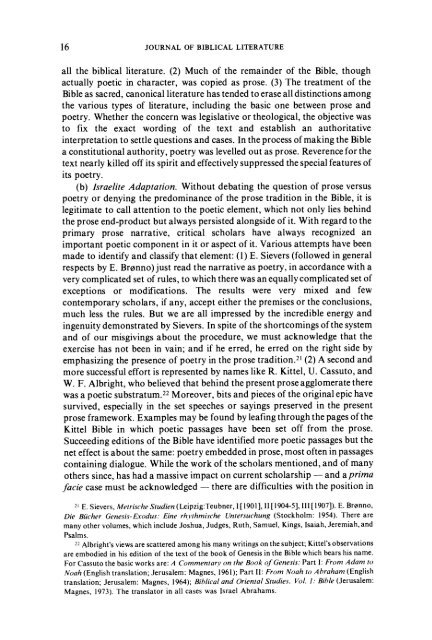POTTERY, POETRY, AND PROPHECY: AN ESSAY ON BIBLICAL ...
POTTERY, POETRY, AND PROPHECY: AN ESSAY ON BIBLICAL ...
POTTERY, POETRY, AND PROPHECY: AN ESSAY ON BIBLICAL ...
Create successful ePaper yourself
Turn your PDF publications into a flip-book with our unique Google optimized e-Paper software.
16<br />
JOURNAL OF <strong>BIBLICAL</strong> LITERATURE<br />
all the biblical literature. (2) Much of the remainder of the Bible, though<br />
actually poetic in character, was copied as prose. (3) The treatment of the<br />
Bible as sacred, canonical literature has tended to erase all distinctions among<br />
the various types of literature, including the basic one between prose and<br />
poetry. Whether the concern was legislative or theological, the objective was<br />
to fix the exact wording of the text and establish an authoritative<br />
interpretation to settle questions and cases. In the process of making the Bible<br />
a constitutional authority, poetry was levelled out as prose. Reverence for the<br />
text nearly killed off its spirit and effectively suppressed the special features of<br />
its poetry.<br />
(b) Israelite Adaptation. Without debating the question of prose versus<br />
poetry or denying the predominance of the prose tradition in the Bible, it is<br />
legitimate to call attention to the poetic element, which not only lies behind<br />
the prose end-product but always persisted alongside of it. With regard to the<br />
primary prose narrative, critical scholars have always recognized an<br />
important poetic component in it or aspect of it. Various attempts have been<br />
made to identify and classify that element: (1) E. Sievers (followed in general<br />
respects by E. Bronno) just read the narrative as poetry, in accordance with a<br />
very complicated set of rules, to which there was an equally complicated set of<br />
exceptions or modifications. The results were very mixed and few<br />
contemporary scholars, if any, accept either the premises or the conclusions,<br />
much less the rules. But we are all impressed by the incredible energy and<br />
ingenuity demonstrated by Sievers. In spite of the shortcomings of the system<br />
and of our misgivings about the procedure, we must acknowledge that the<br />
exercise has not been in vain; and if he erred, he erred on the right side by<br />
emphasizing the presence of poetry in the prose tradition.2' (2) A second and<br />
more successful effort is represented by names like R. Kittel, U. Cassuto, and<br />
W. F. Albright, who believed that behind the present prose agglomerate there<br />
was a poetic substratum.22 Moreover, bits and pieces of the original epic have<br />
survived, especially in the set speeches or sayings preserved in the present<br />
prose framework. Examples may be found by leafing through the pages of the<br />
Kittel Bible in which poetic passages have been set off from the prose.<br />
Succeeding editions of the Bible have identified more poetic passages but the<br />
net effect is about the same: poetry embedded in prose, most often in passages<br />
containing dialogue. While the work of the scholars mentioned, and of many<br />
others since, has had a massive impact on current scholarship - and a prima<br />
facie case must be acknowledged - there are difficulties with the position in<br />
21<br />
E. Sievers, Metrische Studien(Leipzig:Teubner, I[1901], II[1904-5], III[1907]). E. Bronno,<br />
Die Buicher Genesis-Exodus: Eine rhvthmische Untersuchung (Stockholm: 1954). There are<br />
many other volumes, which include Joshua, Judges, Ruth, Samuel, Kings, Isaiah, Jeremiah, and<br />
Psalms.<br />
22<br />
Albright's views are scattered among his many writings on the subject; Kittel's observations<br />
are embodied in his edition of the text of the book of Genesis in the Bible which bears his name.<br />
For Cassuto the basic works are: A Commentarv on the Book of Genesis: Part I: From Adam to<br />
Noah (English translation; Jerusalem: Magnes, 1961); Part II: From Noah to Abraham (English<br />
translation; Jerusalem: Magnes, 1964); Biblical and Oriental Studies. Vol. 1: Bible (Jerusalem:<br />
Magnes, 1973). The translator in all cases was Israel Abrahams.
















